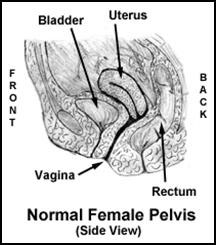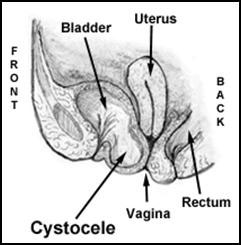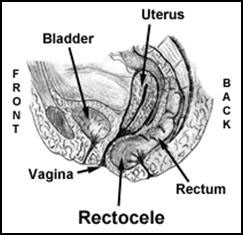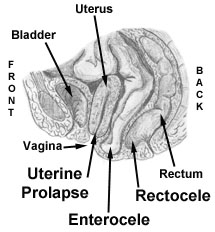
.::: GENERAL TERMS ::::.
u Pelvic floor muscles
– A group of muscles in the pelvis that support and help to control the vagina, uterus, bladder urethra and rectum.
u Bladder
– A muscular organ which stores urine.
u Ureters
– A pair of tubes, each leading from one of the kidneys, to the bladder.
u Urethra
– A short narrow tube that carries urine from the bladder out of the body.
u Voiding
– Passage of urine out of the body.
.::: COMMON PELVIC FLOOR DISORDERS :::.
u Urinary incontinence
– Involuntary leakage of urine.
u Stress incontinence
– involuntary loss of urine during activities that put “stress” on the bladder such as laughing, coughing, sneezing, lifting…etc and it does make trouble to the woman.
u Urge incontinence
– An involuntary loss of urine preceded by a strong sudden desire to void (urge)
(also known as “overactive bladder“).
u Dysuria
– Painful urination.
u Urgency
– A sudden strong desire to pass urine.
u Frequency
– The need to urinate more often than normal (more than every 2 hours or more than 7 times a day).
u Nocturia
– Waking up frequently (more than once) during the night to urinate.
u Cystocele
– Prolapse or bulging of the bladder into the vagina.
u Rectocele
– Prolapse or bulging of the rectum into the vagina.
u Enterocele
– Prolapse or bulging of the small intestine into a space between the rectum and vagina.
u Uterine prolapse
– Prolapse or descent of the uterus into the vagina.
u Fecal Incontinence
– Accidental involuntary loss of solid stool, liquid stool, or gas.
©2018-2023, All rights reserved to Arab Center for Urogynecology and Infertility. Powered By Creativity Design Studio |جميع الحقوق محفوظه للمركز العربي للجراحة البوليه النسائية و العقم | الدكتور رامي محافظة




